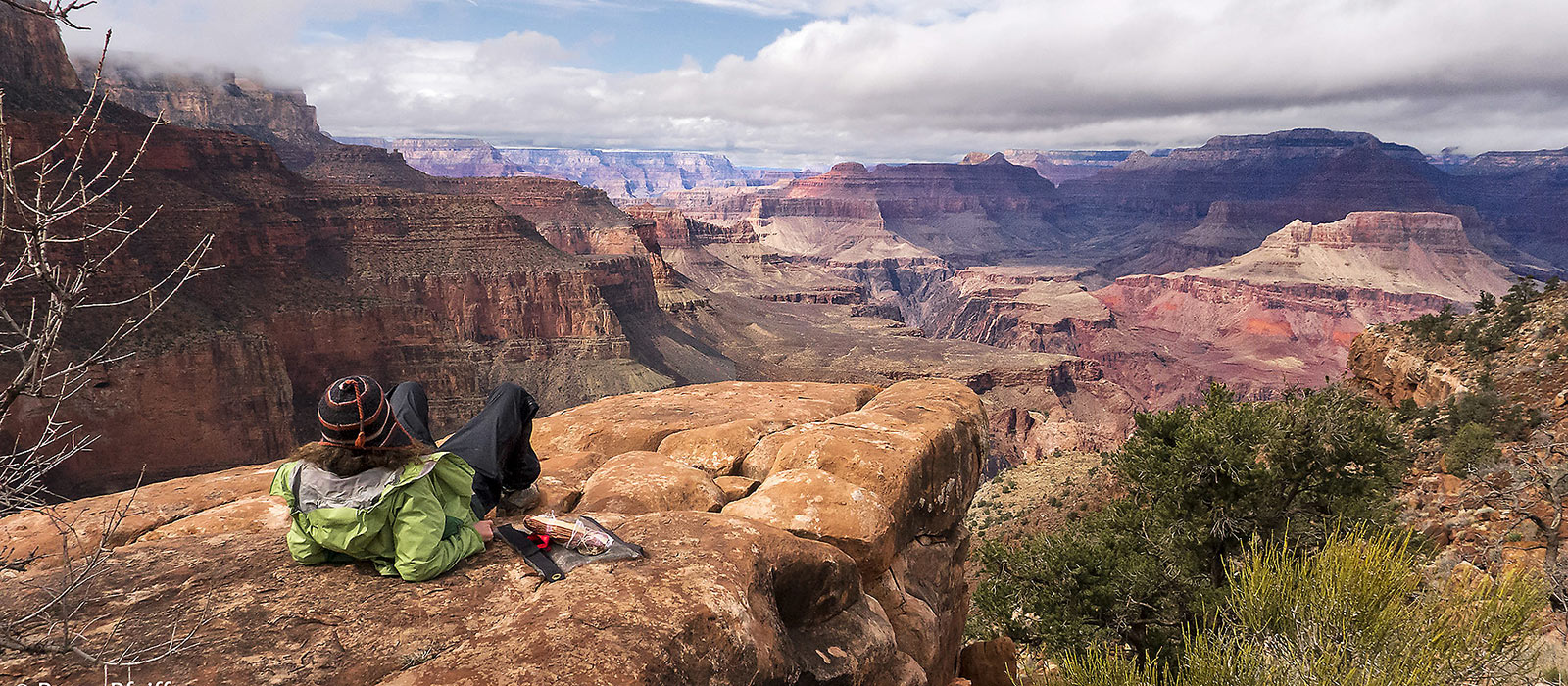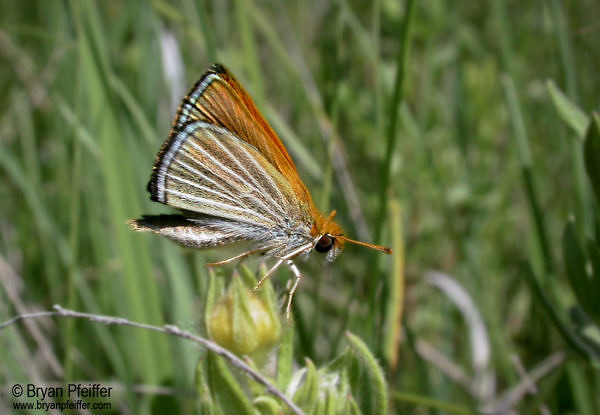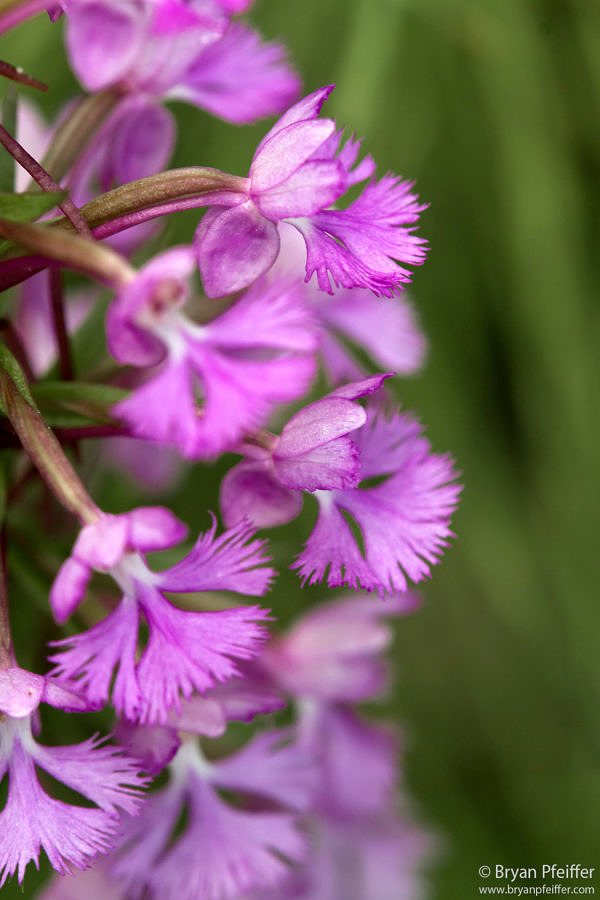
The Extinction of Meaning
What good is a butterfly that does not tweet or turn a profit?
Blogger’s Note (August 15, 2019): Now that the Trump administration has launched its plan to weaken the Endangered Species Act (ESA), here’s my essay (in case you missed it), first published a year ago at Medium.com, about the Act and our fading connection to wildlife and wild places. (By the way, news coverage of these ESA changes has been sensational and, frankly, uninformative. I’m still sorting out the proposal; Ars Technica seems to have a fairly straight take on it.)
One of the most imperiled animals in North America isn’t big and furry like a polar bear. It has neither the charisma of an ivory-billed woodpecker nor the elegance of a prairie fringed orchid. It has incited no eco-wars like those over the gray wolf or the spotted owl. It’s not even a tool in the machinery now undermining the Endangered Species Act. No, this endangered animal is only a butterfly named Poweshiek skipperling.
Saffron-yellow with frosty-white rays on its wings, and no bigger than your thumbnail, the skipperling once flew in untold numbers across prairies from Michigan to Manitoba. Even so, few Americans or Canadians have ever heard of it, let alone seen it. And even though it is already protected under the Endangered Species Act, the Poweshiek skipperling is so imperiled that many of us who have watched it dance across the grasslands probably won’t have the chance to say goodbye.
I first met the skipperling in southern Michigan on July 13, 2003. Rather than float or flutter from plant to plant, skipperlings dart and skip. And when one alighted on a flower bud in a wet prairie fen, I dropped to my belly and snapped a quick photo. Since then the Poweshiek skipperling has vanished from more than 90 percent of its known sites. It may become the first species that I have seen in the wild to go extinct before I do.
So why should we save the skipperling? Those of us who love wildlife and wild places resort to some well-worn arguments in defense of whatever swims, crawls, hops, slithers, walks, grows, or just sits there decaying among us: that rare plants might service humanity as medicine; that some of these animals are “canaries in the coal mines” alerting us to bigger problems in nature; or that imperiled species are part of our national heritage, no less sacred than the Liberty Bell or Old Faithful. All worthy assertions, all anthropocentric, and all too often failures in the new littered landscape of public discourse.
What worries me is that, in the end, I suspect few among us will mourn the passing of a butterfly. For most distracted and besotted Americans, the skipperling is yet another abstraction bound for extinction, something they will never see, let alone understand or even appreciate. What good is a butterfly that does not tweet or titillate?
Identity politics of the charismatic
The old ideas for saving nature don’t work anymore — for any number of reasons, including the ironic. We now watch more nature online than ever, swimming virtually along the Great Barrier Reef or soaring beside limestone cliffs of the Grand Canyon, even as the glowing screens move us further from actual nature. A tiny fraction of humanity will ever actually swim along any reef and the average visitor to the Grand Canyon stays less than a day, a good portion of it indoors. What good is a butterfly that can’t join us at the South Rim for a selfie?
One idea in defense of nature, which comes from environmentalists in academia, think tanks, and other high-minded places, is to show that there’s money to be made or saved from all this biological diversity. Ecosystems provide us with tangible “services” to which we can assign dollar values: mangrove swamps and barrier islands protecting us from coastal floods or storm surges, for example, forests sequestering carbon and easing the climate disaster, or even tangible value in the peace of mind we find in the good company of wildlife. These notions don’t find much traction in the Trump administration. What good is a butterfly that won’t turn a profit?
One of the oddities of extinction is that despite its finality and irrevocability, we’re almost never there to watch it happen.
One of the oddities of extinction is that despite its finality and irrevocability, we’re almost never there to watch it happen, even as it’s happening on our watch like never before. Sequestered behind our gadgets, nobody will be around to see the last skipperling to die. Its demise won’t really hurt, not like the death of a loved one, the closing of the local bookstore, or the loss of civility in our public discourse.
So we environmentalists practice a kind of identity politics of the charismatic, enlisting polar bears, gorillas, pandas and other charismatic megafauna in the fight to protect all endangered species. That’s fine. These animals warrant our sympathies, even if the vast majority of us will never see one or know tangible value from them. For better or worse, they are avatars to actual nature.
Extinction of experience and meaning
What worries me more is that most Americans know little of — and care even less about — the spectacular natural diversity surrounding every one of us. We are ignorant of the rainbow of warblers — dozens of species — passing through in migration each spring. We overlook the orchids growing in roadside ditches. Most of us cannot identify what’s singing or croaking or buzzing in our own backyards.
The lepidopterist, writer, and conservationist Robert Michael Pyle calls this the “extinction of experience” — our estrangement from the familiar. If we do not know what lives next to us, we will not notice when it’s gone.
“So it goes, on and on, the extinction of experience sucking the life from the land, the intimacy from our connections,” Pyle writes. “This is how the passing of otherwise common species from our immediate vicinities can be as significant as the total loss of rarities. People who care conserve; people who don’t know don’t care. What is the extinction of the condor to a child who has never known a wren?”
And there across our degraded commons, I see another tragedy: an extinction of meaning. Besides its practical achievements — not the least of which is the recovery of our national symbol, the bald eagle — the Endangered Species Act is a statement of our aspirations to live within our means in nature. As we encroach on plants and wildlife, as we push species to their limits, the act becomes more a statement about us. It recognizes that we can step back from our giant destructive footprints and try to make amends.
Yet this undermining the Endangered Species Act is an admission that we (or at least the people a minority of us have elected) don’t care about the vulnerable and imperiled anymore. When it comes to skipperlings and the silent nature we have pushed to the brink (like the carbon we pump into the atmosphere) there may soon be little practical or moral limitations on our excesses.
What has the skipperling done for us lately?
What has the skipperling done for us lately? Well, to be honest, not much. When it’s gone, the prairie will look pretty much the same. But not to me. It will be lacking something fundamental — like Fenway Park without the Green Monster, St. Louis without its Gateway Arch, or Yellowstone without eruptions of Old Faithful.
Without the skipperling, the prairie will become a prairie depleted. And so will we ourselves be depleted — not just of a little orange butterfly gone forever, but also of human awareness and restraint, an extinction of what it means to love and live responsibly in nature.



This is great, Jon. And how great it was for me, during a trip to Missouri some years ago, to find little patches of prairie preserved among all the row crops. I was astonished to see postage-stamp prairies thriving (thanks in part to The Nature Conservancy). 🙂
Thank you, Cherie. Very well said. And how could we place an economic value on joy anyway. Not that it’s the most valuable thing in the world, but I can’t imagine a world without it. How lucky we are that our world here still has it, and how painful that far too many people on the planet live without it, don’t see it, or, tragically, live in circumstances (often through no fault of the own) that prevent them from experiencing it.
Thanks, Norma, for the eloquent note. Some readers prefer that I steer clear of politics on the blog. I tend to disagree, and try to navigate an independent-minded and civil course forward on all this. It’s nice to see passion like yours, and it’s nice not have rancor among the comments here. Thanks again!
Having gone to college in Powesheik County, Iowa, the native name for this species resonates with me. I abandoned my adopted state of Iowa and the Midwest entirely because there is precious little native vegetation to be found there, and what is growing is rich in insect-killing neonictinoids (same here in VT), which may be the nail in the coffin for this skipperling and perhaps many others – a sobering thought. And yet, having driven across Iowa a couple of weeks ago, I was amazed at how the roadsides have been transformed from the non-native smooth brome grass to native prairie species – we counted at least a couple of dozen native species – kudos to the Iowa Dept. of Transportation for the linear restoration. Now if we could buy 5,000 acres of farmland and restore it to prairie….
“What does the skipperling do for us?” As I imagine you might also believe, Bryan, there is no reason for it to do anything for humans, and that holds for the rest of the non-human species inhabiting this planet. Unfortunately, way too many people believe the only worthwhile plant and animal species are those which we can turn to our benefit, one way or another. And I believe that is a sad and telling commentary on our species, particularly since we have a history of using up other species until the individuals are all gone. And if we don’t use them up, we degrade and use up their habitat. It doesn’t necessarily take over-population to be the telling factor, when we have GREED sitting on top of it all, ruling with an iron fist.
Bryan,
You’ve written a beautiful essay which captures the complexity, beauty and delicacy of life. I share your sense of sadness over what is passing, much of which will likely not be regained.
The impacts of climate change writ large are all around us. The effects are contributing to the poisoning of our current political/social environment. It is not only the small flying things that are at risk.
And so I suggest that with a tip of our chin to all our fellow natural creatures we get moving and work to turn out the vote in the 2020 election to bring an end to the willful ignorance of this current economic and environmental destruction. If we don’t bring a halt to the destructiveness and greed that this policy sanctions and promotes, and along the way act to restore environmental protections, all of us will find ourselves heading toward a very destructive end. Not just the butterflies, but we and the butterflies together.
Thanks, Jon, for the kind words. Lots of meaning in wilderness. 🙂
Bryan – a beautiful, though accurately heartbreaking essay. Thank you for writing and sharing it.
Thanks, Paul. Yes, I guess it’s our nature. In the end, we’re nurturers and killers alike. I guess the question is how will we temper our proclivities. The ESA is merely one option — more of a small statement, I guess, about our aspirations … and potential.
Thanks, Jo Anne! (I’m with Joan and Ruth now at High Mowing.)
Very good company, indeed. (I’m not worthy.) 🙂
Yes, connection and harmony. Lovely terms. Thanks, Yvonne.
Thanks very much, Tiffany.
A privilege to have you there standing beside me, Ali!
You’re most welcome, Mike. Thanks for reading.
You’re welcome, Micki. Thanks. It means a lot to me.
No doubt that, overall, human population growth — particularly resulting industrial-scale agriculture — is a proximate cause for declines in biodiversity. I welcome your point, Chuck. The way I see it, however, is that a huge force behind the climate disaster is carbon use mostly by ordinary Americans — all of us, and billions of others in the developed world — simply the way we live, the fossil-fuel dependent lives we lead (for everything from mobility to food). One result of all that, rising sea levels, will cause a massive displacement of people from sea-level nations all over the world — millions of people, most of whom don’t produce a lot of carbon by comparison to us. But they’ll be climate refugees on a scale far greater than the influx of any immigrants to the U.S. At least that’s the prediction, which seems reasonable to me. Thanks again for your comment!
Yeah, thought — a very good thing. 🙂
Thanks, Ann. Well, maybe every little bit helps. 🙂
Nice to hear from you, Marcia!
Thanks so much, Joanne.
Hi Carol. By all means, please share my essay. An honor!
Wonderful essay, it moved me deeply. Thank you for your caring, intelligent thoughts, as always. My thought is that every living thing on this earth has a reason to be here and each depends on the other. There was harmony and connection. The world was created perfectly.
My thought is that what is happening now… will be for our own peril… even with the smallest of living things gone…
Moving read. Very much admire your work.
Thanks Bryan for your powerful message, advocating for another silent species that deserves to be here! I stand beside you.
Thank you so much for your essay!
Thanks, Bryan. You have again written thoughtfully about the important things. Appreciated.
The biggest cause of loss of biodiversity and increasing carbon emissions and unaffordable housing is human population growth driven in this country by mass immigration. If extinction was really a priority for you, there should be a word somewhere or occasionally about the importance of limiting immigration.
thought provoking …………
A worthy sequel to Garrett Hardin’s piece “Tragedy Of The Commons.” Thanks Bryan!
Thank you, Bryan. Your essay touched me deeply.
What a shame to lose ANY species to extinction. Future generations denied the pleasure of enjoying creatures that were here long before we were. For example, I will never see an Eskimo Curlew because of thoughtless hunters of the 1800s. And now in the 21st century we are told that numerous species are headed towards extinction. So instead of continuing to take action to save species the administration is committed to destroying species in the name of greed.
What a powerful essay. Thank you for sharing it with us. The saddest part is the fact that the people who need to read it probably never will.
Amen, Brother!
great article!! and so eloquently elegantly written…
Asking permission to put this up on Facebook. Great article and too true, unfortunately.